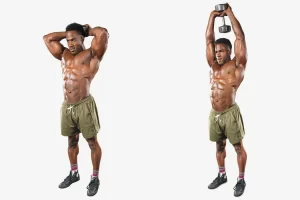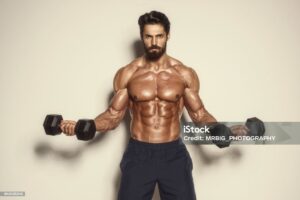
Introduction to Chest and Tricep Workout
When it comes to chest and tricep workout, understanding how muscle works, and are built is very important. That is why I have explained what bodybuilders and gym enthusiasts need to understand about muscle anatomy before lifting weights in this article.
If you are just getting off your bodybuilding journey, or you just want to keep fit, or you are already working out but want to see results faster and better, everything you need to know about chest and triceps workout can be found in this extensive article. Practising what you will learn in this article will boost your strength and enables you to sculpt your upper body, giving you that perfect look of a healthy and fit man you desire.
A chest and triceps workout is a strength training that works the pectoral, otherwise known as the chest, and the triceps, otherwise known as the muscles on the back of the upper arms. The good thing about Chest and Tricep workout is that the two target portions of the upper body can be built together with the same and various workouts, a term known as compound workout, but interestingly, they can be built individually in a workout term; isolation workout or exercise.
A chest and tricep workout is designed to build chest and arm muscle mass, overall strength, and endurance in the targeted areas. If you are already excited, and energised, and feel like jumping in to sculpt your chest and triceps, then let’s get started.
Chest and Tricep Workout
To most people, chest muscles are part of the most difficult muscles to grow, either at home, or at the gym. There are several reasons why this remains common to most people, especially beginners. However, understanding these reasons can help you navigate through the difficulty growing your chest.
Triceps are actually easier to build than chest. In most cases, people focus on triceps since it grows faster than chest. This is wrong when it comes to building upper body.
If you want to sculpt your chest explosively, then you have to calm down and learn the tricks and secretes behind chest sculpturing. All secretes about growing chest muscles borders around knowing the reasons why chest muscles are difficult to grow, as well as knowing what to do to combat these challenges if you experience them.
Why Chest Muscles might be Difficult to Grow
Everybody wants to do things the easy and fastest way and get best results with no side effects. But the right information and understanding is all that is needed to get started. Below are some of the reasons why you might find it difficult to sculpt your chest.
Genetics
An individual’s genetic makeup can affect the arrangement of his muscles in his chest. One reason why someone might find it difficult to grow his chest might be find in his muscle fibre composition.
If you have a higher proportion of slow-twitch muscle fibre than fast-twitch muscle fibres in your chest, this could lead to slow or difficulty growing your muscle.
Slow-twitch muscle fibres are more endurance-oriented and less hypertrophy-prone. This means that they are difficult to tear. Remember that during exercises, targeted muscles are exposed to tensions leading to them tearing. It is this tearing that results in muscle growth as the body tries to heal.
Secondly, the muscle insertion points can affect chest muscle development. The attachment points of the chest muscles can vary, this can affect leverage and the muscles’ ability to develop in size and strength, resulting in wasted efforts.
Form and Technique
The way an individual does his workout can affect his result. To achieve growth in your targeted part of the body, your form and technique must be the ones that will yield result with no injury. Improper form during workouts can shift the load away from the chest muscles and onto the shoulders or triceps. This can lead to reduced chest activation.
Additionally, your range of motion plays a crucial role alongside your form in muscle building. If you neglect full range of motion, you might experience wasted efforts during chest and tricep workout.
For instance, during bench press, you are expected to put pressure on your chest if you want to sculpt your chest. However, not lowering your weight enough during a bench press can lead to reduced chest engagement, making it difficult to target your chest properly. Proper form and range of motion can even build both chest and triceps at the same time. Just be intentional about it.
Exercise Types and selection
It is said that variety is the spice of life. This is also applicable in bodybuilding workouts. Monopoly of workout can lead to plateaus. If you have limited variety of exercise, you may find it difficult to grow your chest.
Varying your workout choices can target different parts of the chest leading to an explosive-looking chest in few workouts.
Additionally, isolation is important as much as compound movements are. A compound workout like bench press is good in achieving good result, but engaging in isolation workouts like flyes and cable crossovers can help target the chest more directly, leading to an improved result.
In essence, combining both compound and isolation workouts is crucial in achieving better and faster results.
Training Intensity
Training intensity affects muscle growth in several ways. For instance, if you are not lifting enough weights , or/and not reaching muscle fatigue, can delay or prevent muscle growth.
For a fast and reliable muscle sculpturing, take your workout seriously. Follow instructions accurately as any deviation may affect muscle growth. In some cases, it can lead to injury.
Additionally, inadequate volume or repetition can hinder muscle development. For a better chest and tricep sculpturing, it is important to go for higher reps. This can stimulate muscle growth, especially for individuals who have muscle fibres that are less responsive.
Nutrition and recovery
When it comes to muscle training, nutrition plays a crucial role. Most times, your nutrition determines if your workout plan is achievable or not. You need proper meal starting off. More so, you need proper meal to recover properly after each workout.
Inadequate protein consumption, as well as overall poor nutrition habit can delay, or even hinder muscle growth. Adequate protein intake and overall proper nutrition is beneficial to muscle repair and growth, before, during, and after works.
Under-training and over-training
Inadequate training can result to poor or no result. If you do not train enough, you will not get the desired result. More so, if you over-train, you won’t give your muscle enough time to recover.
You might feel bigger and stronger during workout, but in reality, muscle actually grow better during rest. In essence, for a better chest muscle growth, watch your meals, train responsibly, and take rests in-between workouts to enhance muscle recovery and of course, muscle growth.
Mind-Muscle Connection
Most people who complain about finding it difficult to grow their chest muscle lack mind-muscle connection. If you lack proper concentration during workout, you may have delayed chest muscle growth. Not concentrating on engaging the chest muscles during exercises can reduce effectiveness leafing to wasted efforts.
To ensure that chest muscles are properly activated, you must develop a strong mind-muscle connection. You must be intentional about focusing on your chest muscle for best result.
Meanwhile check out these health tips for men.
Workouts to Sculpt Your Chest and triceps
Barbell Bench Press

Barbell bench press is usually performed at the gym. However, you can hire an expert to construct one for you at home.
Barbell bench press is a popular workout that works the chest, shoulder and triceps. If you are looking for a perfect chest and tricep workout that will help you to sculpt your upper body, consider taking barbell bench press serious.
To perform barbell bench press, follow the following guide.
First thing first, find the right angle of grip for your body size. To do this, lay on the bench, stretch your hands upwards, then lower them while tucking in your elbows until it gets to about 45 degrees. At this angle, fold your fingers and extend your thumbs. Bring down your hands until your thumbs touch your nipples while your elbows remain at about 45 degrees.
This is your angle of grip for your body size. Next, raise your hands at this angle, making sure not to scatter the form. Grasp the bar and pull it out of the rack or holder. Arch your back to create visible space between your lower back and the bench.
The best way to do this is to place your upper and lower backs firmly on the bench. Then gradually pull down your upper back while your lower back remains firmly placed on the bench. Do this until your chest pulls up creating visible space between your upper and lower backs.
Pull down the bar until it touches your body (your nipples particularly). At this point, stamp your feet firmly into to the floor and press the bar back up. Continue this lifting and lowering the weight for the rest of the reps.
To target your chest more, develop mind-muscle connection. This will help you to put more pressure on your chest.
It is important to maintain the initial angle of grip while your elbows remain tucked in throughout the bench press. Pressing at angle 90 degrees may lead to shoulder tear and other injuries.
Dumbbell Bench Press

Dumbbell bench press is similar to barbell bench press. the major difference is the use of barbell in barbell bench press. While in dumbbell bench press, dumbbells are used instead.
To do this, retain the form and position in the barbell bench press workout above, lift the two dumbbells of equal weights above your shoulder level. Then press the weights straight up and down.
Alternating Dumbbell Bench Press

To accurately perform alternating dumbbell bench press, lay face-up on a bench ensuring that your are well balanced at the centre of the bench, grasp the dumbbells on both hands with your palm facing your thighs, lift both weights over your chest.
Keeping one arm straight above your chest, lower the other one until the weight touches your chest or outside of your shoulder. Push back up while lowering the other arm in the same manner. Alternate both arms in this manner until your target reps is complete. In each rep, ensure to push further away with each hand, as if trying to punch the ceiling.
Hips-Off, Single-Arm Bench Press

To perform a perfect Hips-Off, Single-Arm Bench Press, lie on a flat bench with a heavy dumbbell on one hand, then push your lower body off the bench. Lift the weight in one hand ensuring to reach peak height, as if trying to throw a punch. Lower the weight until it touches your chest or shoulder. Repeat this process until reps is completed.
Complete each rep before switching sides.
Cable Crossover

To perform a proper cable crossover and sculpt your chest, stand between two opposite cable stations with both pulleys set midway between the top and bottom of the station. Fit a D-hand to each pulley for convenience, then grasp one in each hand.
Check this out: Muscle Anatomy: What Bodybuilders Need To Know Before Lifting Weights
Standing upright, slightly push your chest forward, extend your hands while slightly bending your elbow, create tension on the cables by stepping forward. Pull the pulleys sideways; in opposing direction as if trying to lock both hands together.
Flex your pecs as you pull the cables towards both hands as they align with your chest line.
Incline Dumbbell Press
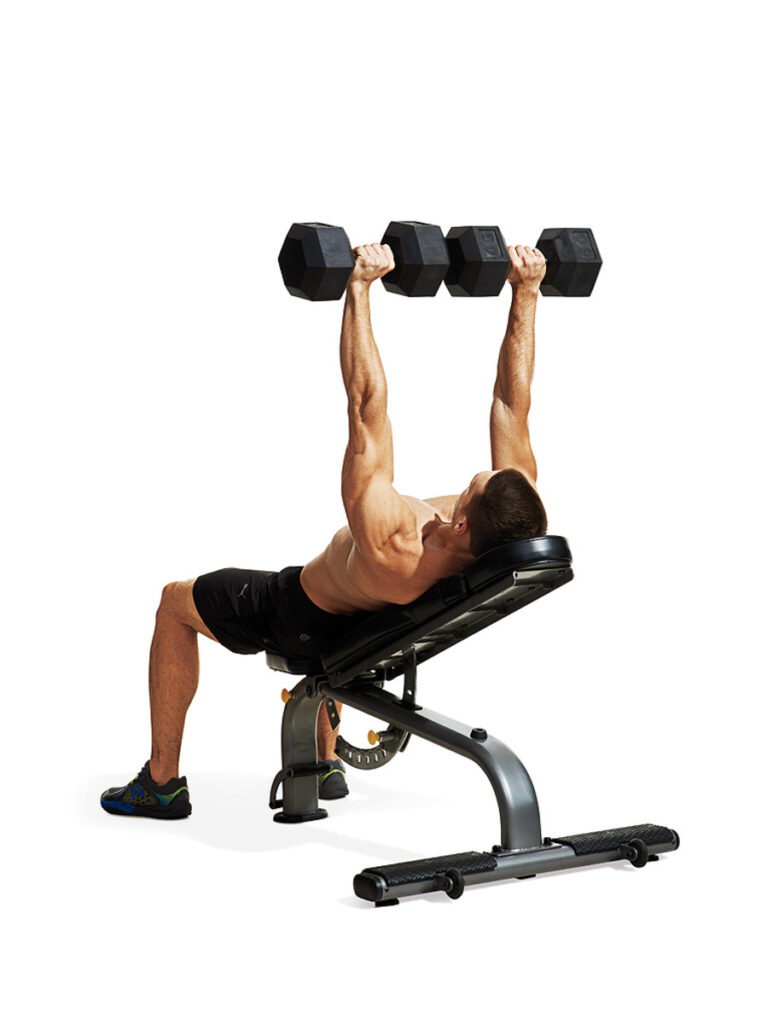
Incline dumbbell press is similar to dumbbell bench press, however, it is performed on an inclined bench rather than on a flat bench as in the case of dumbbell bench press.
For a perfect inclined dumbbell press, adjust the bench to about 30 to 45 degree. Lie on it on your back with dumbbells on both hands. If you can, push forward your chest while your back remains fixed on the bench. Press the weights over your shoulders while bracing your core throughout the exercise
Dumbbell Half Flye

Lie flat on a flat bench while holding two dumbbells on both hands above your chest. Open wide your arms as you lower the weights out to your side. Push your chest up as always.
You should feel a stretch in your pecs, then lift the weights halfway up, then pull it down again the bottom position. Do this for the rest of the reps.
Each rep should take about six seconds to complete. This means you should tale three seconds to lift the weights up, and another three seconds to bring them down. Do not be too fast while engaging in this exercise if you want to see results.
Dumbbell Flye

Lying on a flat bench with your chests pushed up, and dumbbells on both hands, slightly bend your elbows, and spread your arms wide. Turn your writs so your pals face each other. Lower the weights until they align with your chest.
Flex your pecs and return the weights back up from the initial position. Ensure that there is a visible gap between your upper and lower backs throughout the reps.
Incline Dumbbell Flye

This is similar to dumbbell flye, but it is done on an inclined bench. Set an adjustable bench to a 30°-45° angle, and perform the exercises as in dumbbell flye above.
Low-Incline Press

To perform this workout accurately, set an adjustable bench to an incline of no more than 30°, or rest a flat bench on a weight plate or mat to tilt it slightly. Then follow the instructions for Barbell Bench Press above.
Speed Bench Press

Follow the instructions for bench press as described above, but do so on a totally flat bench. Unlike the normal bench press, the lifting and lowering of the barbell should be done as fast as possible. Also, lower the weights for convenience.
For instance, if you can normally bench press 200lbs, reduce it to 150lbs or lower, lift and lower with speed.
Landmine Press

Fit the desired weight on one end of the barbell. Place the other end on the floor, or at the edge of the wall to wedge it while you carefully grasp the end that carries the weight.
Carefully raise the barbell up so it stands slant by the wall with your hands holding the other end. If you need to, wrap a towel around the end your hand holds for firm grip.
If you are beginning with your right hand, push back your right leg and bring forward your left leg for balance.
Push up and pull down the barbell end with few seconds hold per rep. Complete the reps on one hand then switch sides.
Floor Press

Brace your core while lying flat on the floor with dumbbell in each hand. Position your palms and triceps such that they each other. Ensure your elbows do not face each other in this manner, but rest on the floor instead.
Press the dumbbells up in an explosive manner, then lower them until only your triceps touch the floor. Pause for at least two seconds before you begin the next rep. Gradually increase the weight after each set.
Prone Flye

In a pushup position on the floor, hold dumbbells in each hand facing each other. Spread your arms apart as if trying to perform normal dumbbell flye.
Brace your abs and gluts and flatten your back. Lower your body until you feel a stretch in your chest.
Squeeze the dumbbells and bring your hands back to pushup position.
Use plate-loaded dumbbells for this workout to reduce friction. However, if you don’t have plate-loaded dumbbells, you may consider placing towels on the floor to achieve the same result.
Take caution while engaging in this workout to prevent your jaw, head, or chest hitting the floor. This can result to injury.
If this workout is too difficult for you to perform, perform the exercise on your knees instead.
Dumbbell Pullover

Lying on your back on the floor, hold one dumbbell overhead with your hands. Press the weight over your chest with your elbows only slightly bent. Return to the previous position and repeat this process for the entire reps.
Take a deep breathe after each rep.
Plate Pressout

This exercise requires two light weight plates. Do not use heavy dumbbells, especially if you are a beginner. This workout should be done in three reps.
In the first rep, hold the two plates described above together right in front of you. The plates should be held between your palms, smooth aside.
Focus on your chest, squeeze the plates together, and press them in front on you until your arms are extended in front of your chest.
Hold a second, flare your lats and pull the weights together back to your chest. Repeat this process for the rest of the reps.
In the second set, press the weights downward from your chest at a 45-degree angle. On the third set, instead of repeating the two above, press the weights upward from your chest at an angle of 45-degree.
3-Way Suspension Trainer Flye

Attach a suspension trainer to a sturdy overhead object that is firmly supported. Lengthen the traps with your both hands to form a pushup position.
Ensuring that your hands are under your shoulders, perform traditional pushups holding the handles of the traps firmly to prevent falling off.
If you can, combine pushup and flye in several reps and set for better result.
Pushup

The right way to perform pushups is to ensure that your elbows do not point outwards from your body aligning with your shoulder.
While in a pushup position, your upper body should form an arrow-shape, not a T-shape. To achieve this, tuck in your elbows close to your body until it forms angle 45-degrees.
Remember to keep your entire body straight while bracing your core. Push down and pull up holding up for 2 seconds on each rep.
Suspension Trainer Reverse Flye to External Rotation to Face Pull

Men’s Journal explains this intense workout as below:
Reverse Flye:
Grasp the handles and lean back away from the trainer’s attachment point so your weight is on your heels and your body is about 45 degrees to the floor.
Allow your arms to extend in front of you.
Squeeze your shoulder blades together and draw your arms back until they’re 90 degrees out to your sides.
(Keep a slight bend in your elbows.) That’s one rep of the reverse flye. Perform five reps.
External Rotation:
From the start position of the reverse flye, draw your upper arms back with your elbows bent 90 degrees and knuckles facing the ceiling.
Your upper body should make a W shape.
That’s one rep of the external rotation. Perform five reps.
Face Pull:
From there, return to the starting position with arms extended and pull your hands to your forehead, twisting your palms to face in front of you as you pull.
That’s one face pull. Perform five reps. All of the above equals one set.
One-Armed Medicine Ball Pushup

Place one hand on the ball and the other hand on your chest. Perform a pushup in this position by lowering your body until your chest is just above the floor. Push back up to the previous position.
Switch hands and perform the same process to complete one rep.
If this is difficult for you, place the other hand on the floor instead of your chest.
Medicine Ball Pushup “Drop ‘n’ Pop”

In a pushup position, place two hands on the ball. Quickly remove your hands off the ball and spread them on the floor. With that speed, lower your body until it touches the ball.
Quickly move your body up and place your two hands on the ball again at the same time.
Close-Grip Pushup

Perform a normal pushup, but this time, bring your two hands in a close grip. If you can, combine it with diamond pushups by bringing your hands close enough to almost touch each other.
The closer your hands are, the more emphases and focus is placed on your triceps.
Medicine Ball Crossover Pushup

In a pushup position, place one hand on the ball and the other on the floor following normal pushup instructions. Perform a pushup in this position and quickly pass the ball to the other hand. Do the same to complete one rep.
Plyo Pushup
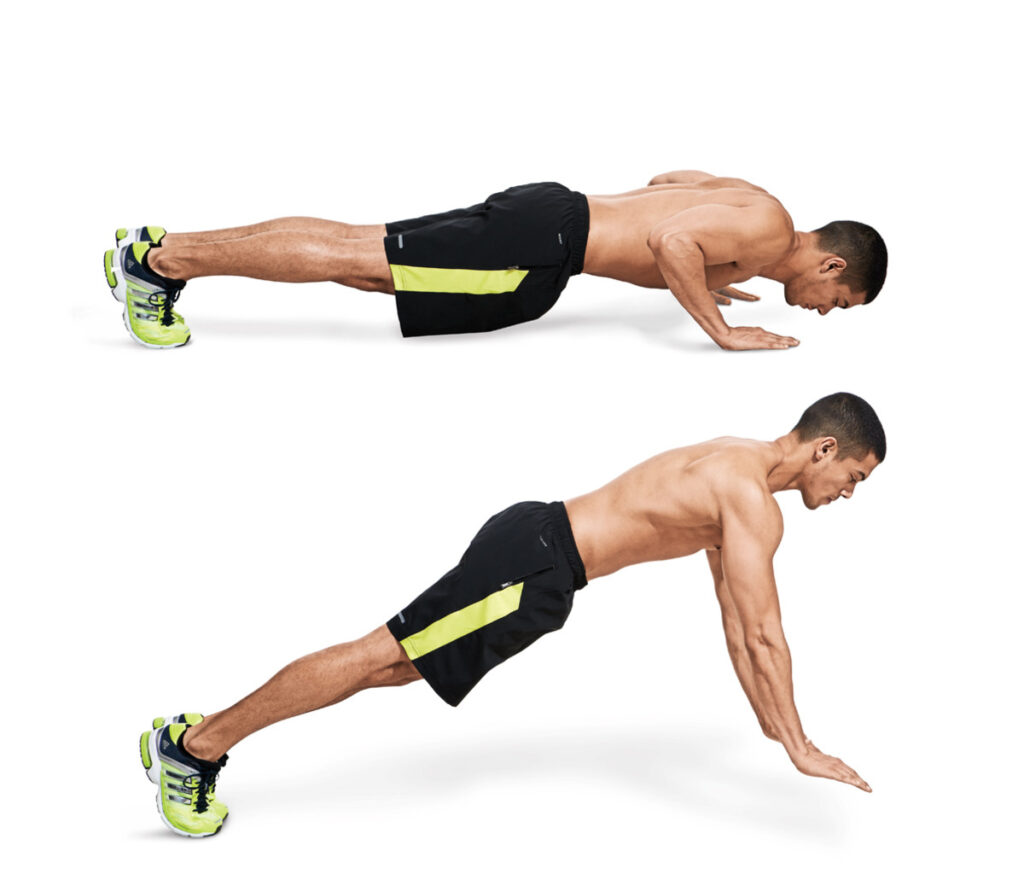
Position yourself as you would if you want to perform traditional pushups. Push down until your chest is just above the ground. Quickly throw your upper body backward forming a longer extension from the ground.
Clap if you can while your hands and upper body are still on air. fall back to pushup position to complete one rep. Continue the reps just immediately after each rep. Stop immediately you begin to feel weak no matter how little your reps are.
Wide-Grip Pushup

Perform a normal pushup, but this time, your hands should be far apart, creating a wider arm away from your body.
Band-Resisted Pushup w/ Feet Elevated

Hold both ends of the band through your upper back. Get into pushup position with your hands pressing the ends of the band on the floor.
Elevate your legs on a box. Perform pushups.
Band-Resisted Flye
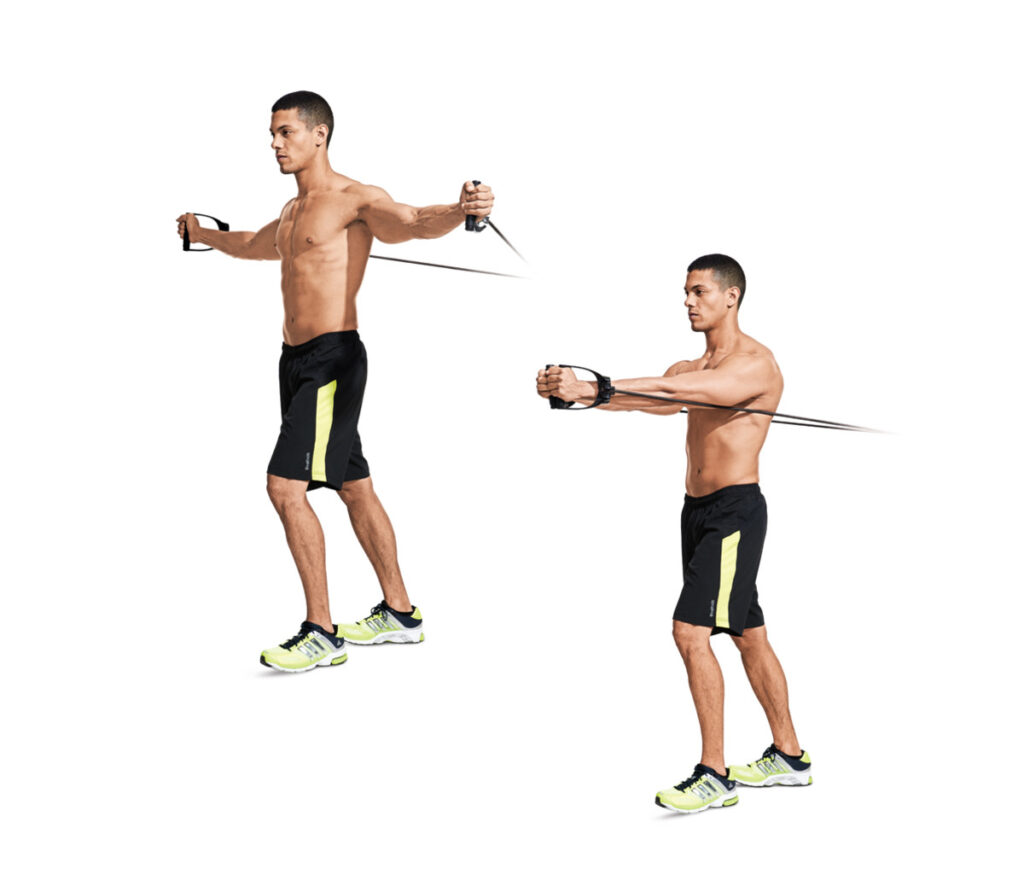
Perform normal flye as explained above, but this time through the back, instead of through the sides or front.
Triceps Extension

In a pushup position, place your elbows and forearms flat on the floor with your palm facing facing the floor. Stay in this position for more than 30 seconds.
Pec Deck

Position the vertical bars of the Pec Deck close to the machine. Gasp each bar with each hand one at a time. Lower your shoulder such that your elbows are tucked inward at am angle of about 45-degree.
Protrude your chest and pull the handles together towards your chest. Resist tension on your way back. Depending on the design of the machine, you can do this either facing or backing the machine.
Wide-Grip Dips

Place both hands side by side on two barbells that are wide apart, just a bit wider than your shoulder. Grasp the bars and pull yourself up until your hands are fully stretched.
Gradually pull yourself down just nearly to the initial position without your legs touching the floor. Repeat this throughout the reps.
Smith Machine Incline Press

Perform a normal incline bench press in smith machine with your bench elevated at about angle 30-degree.
Low-Cable Crossover

Perform normal cable crossover, but this time, focus on your upper chest by pulling the cables up to your upper chest. The cables must extend from somewhere close to the floor for perfect workout.
Decline Pushup

In a pushup position, incline your legs on a phyio ball or bench or box. Perform a slower form of pushup with your core and lower body braced.
Back Lunge to One-Arm Chest Pass

Men’s Journal perfectly explains how this exercise is performed as shown below:
- Stand facing a sturdy wall, 5 feet away, with feet slightly wider than shoulder-width apart, elbows bent at rib cage, medicine ball just below sternum, and elbows pointing outward.
- Step right foot back into a lunge, rotate torso clockwise slightly, bringing ball toward your right shoulder, supporting it with your right hand.
- Keeping core tight and neck neutral, drive through left heel as you step forward with your right foot to forcefully throw medicine ball against wall with right hand. Collect medicine ball, reset, and repeat.
Med Ball Pushup

Grab the ball nearly by the sides with both hands. Place yourself in a pushup position and lower your body until it nearly touches the ball.
Pull your upper body as far as possible before lowering your body again. Repeat this process throughout the reps.
Carefully control the ball with your hands to avoid slipping as this can lead to injury.
The below exercises can be understood by following the poses in the images.
Medicine Ball Rotational Throw

The below exercises can be understood by following the poses in the images.
One-arm Flye Pushup

Chest Press Machine

Banded Chest Flye

High Peak Pushup

Spiderman Pushup

Plank to Pushup

One-arm Hang Snatch
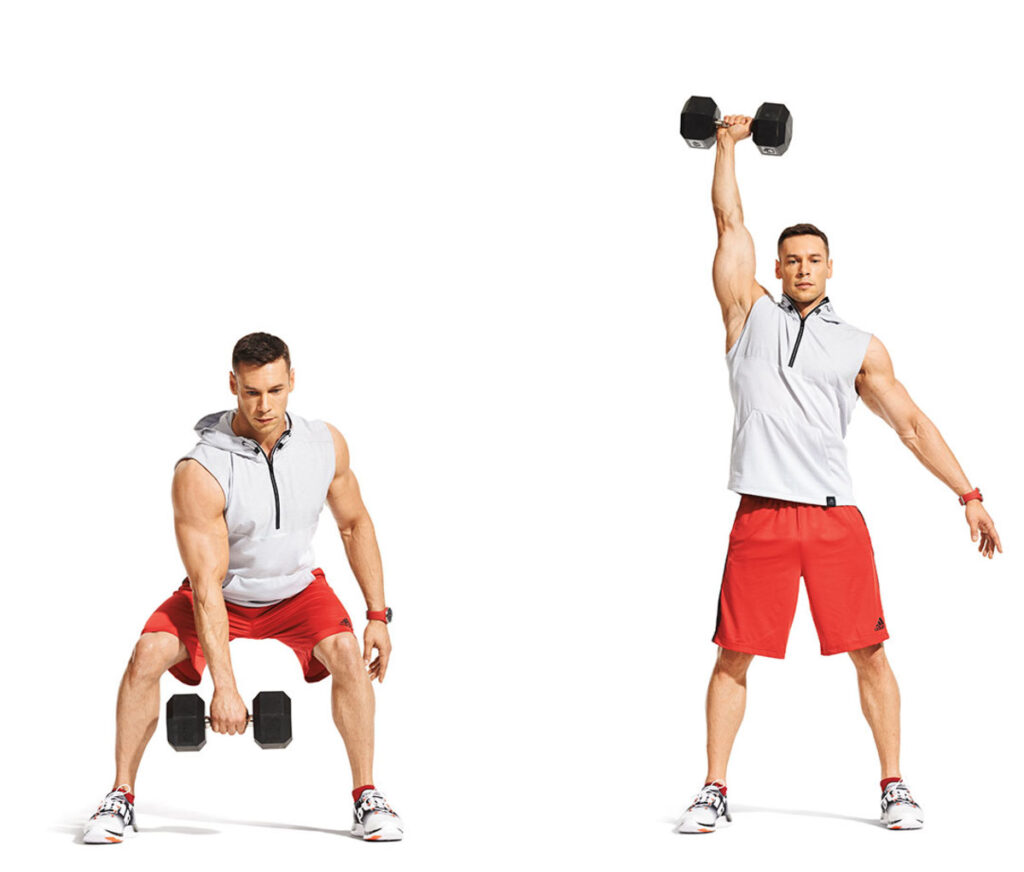
Split-Stance Head-to-Hip

Medium Cable Flye

3-Way Pushups

Burpee

Dowel Rod Pushup

Landmine Standing Reach

Incline Cable Flye to Chest Press
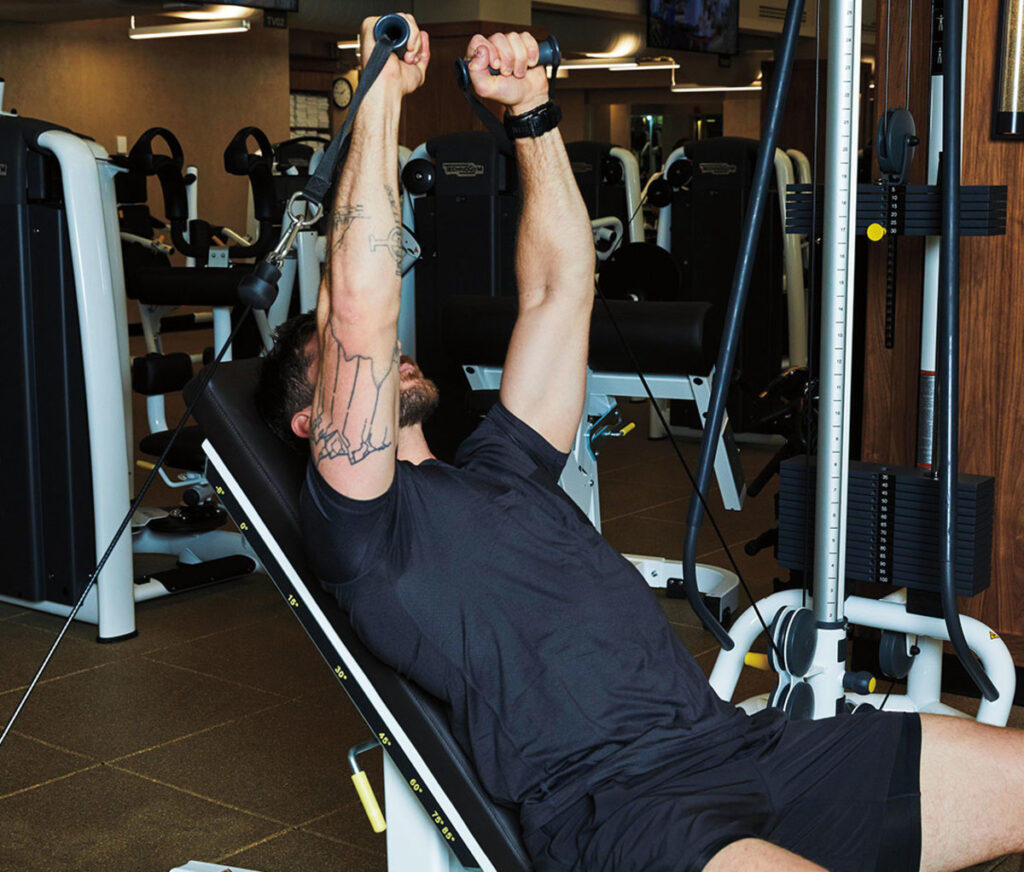
Other chest and triceps workouts
Other workouts that sculpt chest and tricep include:
- Triceps kickback
- Close grip bench press
- Overhead triceps extensions
- Push-down
- Lying triceps extension
- Tricep extensions
- Bench dip
- Parallel bar dip
- Dumbbell triceps extension
- Tricep dips
- Triceps pushdown – rope attachment
- Diamond pushups
- Dumbbell tricep extension – Pronated grip
- Cable rope overhead triceps extension
- Close-grip dumbbell press
- EZ-Bar skullcrusher
- Reverse grip bench press
- Push press
Combining the above workouts, with proper form, nutrition, dedication, consistency and determination, you can easily sculpt your chest and triceps, as well as your entire upper body.

OKOLIE NWACHUKWU ANTHONY
Okolie Nwachukwu Anthony is a Biochemist, Writer, Blogger and Author known for his book “The Sorrowful Fall of The Risen Voiceless: Resilience and Bravery Against the Forces of Darkness.” He is the founder of PharmaFoodHealth.
In addition to his work as a writer, blogger and author, Okolie Nwachukwu Anthony is a Chemical Analyst and Quality Control Officer at Fidson Healthcare PLC. His professional roles involve ensuring that pharmaceutical products meet the necessary standards to safeguard the health of end users.
